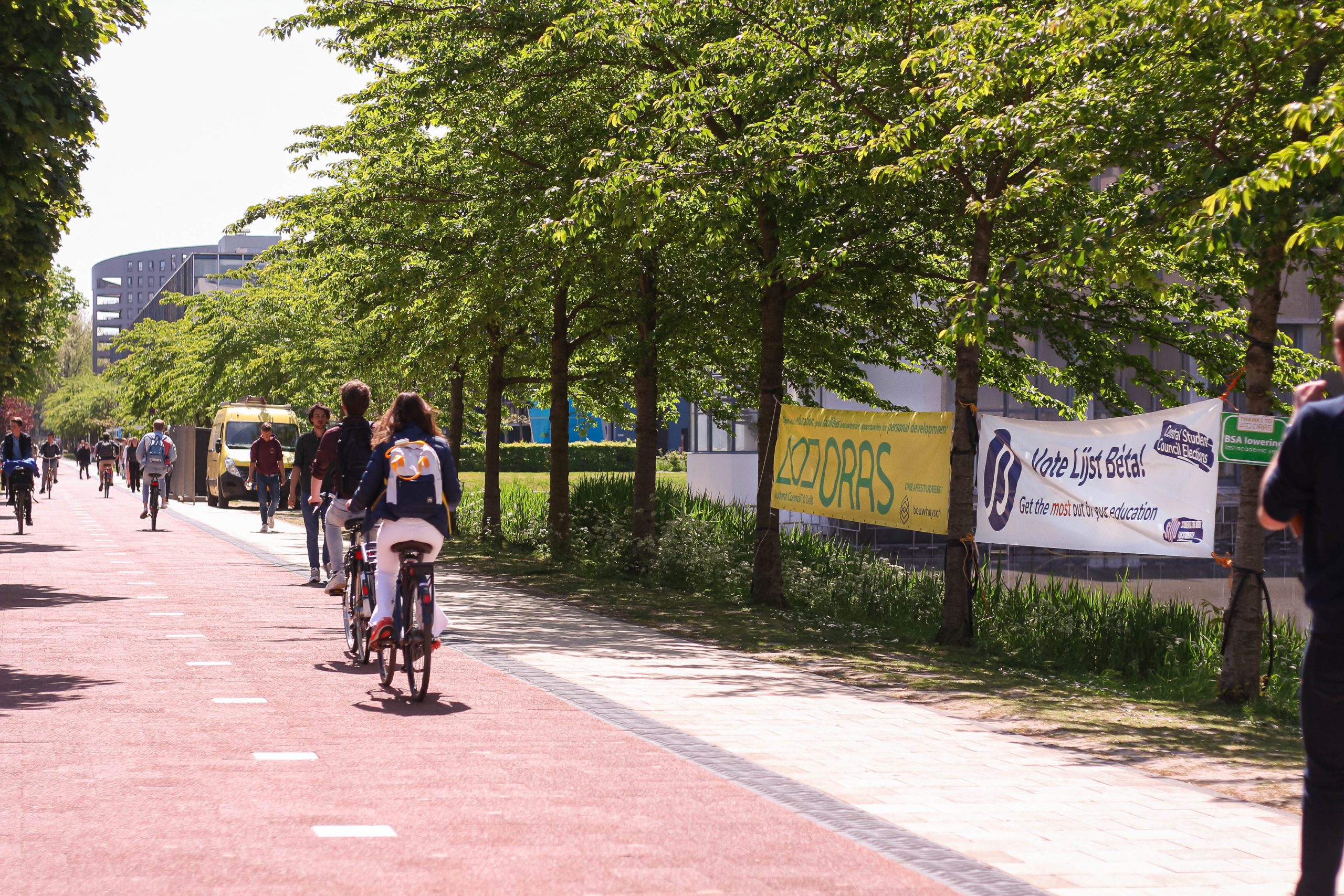If it were up to Minister of Education Dijkgraaf, the BSA would be lowered to a maximum of 30 points. Not a good idea, say the Executive Board and the Student Council.
Student parties Oras and Lijst Bèta are not in favor of a bsa of thirty points. (Photo: Justyna Botor)
Minister Robbert Dijkgraaf (Education) dropped a bombshell last week: as of the 2025/2026 academic year he plans to lower the binding recommendation of the continuation of studies (BSA) to up to 30 study credits. This should help ‘improve student welfare’, he writes in his letter to Parliament (in Dutch), which has yet to vote on the proposal. Currently, there is no national standard, and TU Delft and other institutions set the limit at 45 credits. This puts ‘too much pressure on students’, writes the Minister.
The plan sounds more sympathetic than it is, says Vice Rector Magnificus Rob Mudde. A lower BSA may even have the opposite effect, he thinks. “When students enter their second year, it means that they are even further behind. And if they then still have to decide whether their study suits them or not, the stress has already built op even more. The years tick by, just like their student debt.”
When the BSA was introduced in 2009, TU Delft initially opted for a standard of 30 credits. That “didn’t work at all”, Mudde reflects. “Students took to it, which affected the rest of their studies as well. Do the maths, it would take five or six years to get a bachelor’s degree.” Three years later, TU Delft raised the bar to 45 credits. The instrument now does what it is supposed to do, Mudde says. “It ensures progress and it makes students think about whether they are on the right track in their degree programme.”
Strategic behaviour
Student party ORAS is also not in favour of a BSA of thirty credits. It encourages ‘strategic behaviour’, Chairman Marten Leenders says. It makes it more attractive for TU Delft students to only choose easy subjects in their first year and postpone the difficult ones until after they have passed the BSA of 30 credits. “That way, they find out too late whether a study suits them and whether they can handle it.” Lowering the BSA to 40 points would be a better option, says Leenders. “That takes off some of the pressure, but makes sure students can’t completely avoid the difficult subjects.”
In addition, Leenders’ party argues for customisation, instead of one national standard. Per institution – “it is generally known that studies at TU Delft are relatively demanding” – and perhaps even per programme if the ‘difficulty and identity’ of the study requires it. According to ORAS, the amount of the BSA should be determined by each university in consultation with the representation councils.
‘It is really a pity that politicians listen so poorly’
The Lijst Bèta student party sees no point in reduction either, Chairman Abdelkader Karbache says. “We prefer to see a kind of border area between 40 and 45 credits in which you’re obliged to talk to the study advisor. If you don’t get your marks because you are a carer, for example, that’s completely different than when you don’t like your studies.”
He also thinks that it is not desirable for students to get just half the marks and then be allowed to continue without supervision. So more customisation, but still binding to avoid indecision. In this way, the BSA is more in line with its original purpose, the party believes, which is to ‘help people find the most suitable study programme’.
Other solutions
The concerns about student welfare are nevertheless justified, say both the Executive Board and the student parties. It’s just that lowering the BSA is not the solution. However, some study programmes at TU Delft could be organised better, Mudde thinks. In addition, he believes that enormous pressure is being put on young people who “have to succeed” and have a “great life”. He calls the abolition of student finance ‘a financial millstone around the neck’.
ORAS and Lijst Bèta also believe that a lower BSA will not take away student stress. Lijst Bèta chair Karbache says that “Even then, all the other stress factors remain.” ORAS chairman Leenders says that “We fear that the reduction will be used to claim that they have done something about student welfare. That would be a shame, because much more needs to be done.”
Mudde regrets that despite all the previously shared concerns and counter-arguments, the Minister is now introducing the reduction. “It is not only the administrators like me, but also the students who are against it. It is really a pity that politicians listen so poorly.”



Comments are closed.